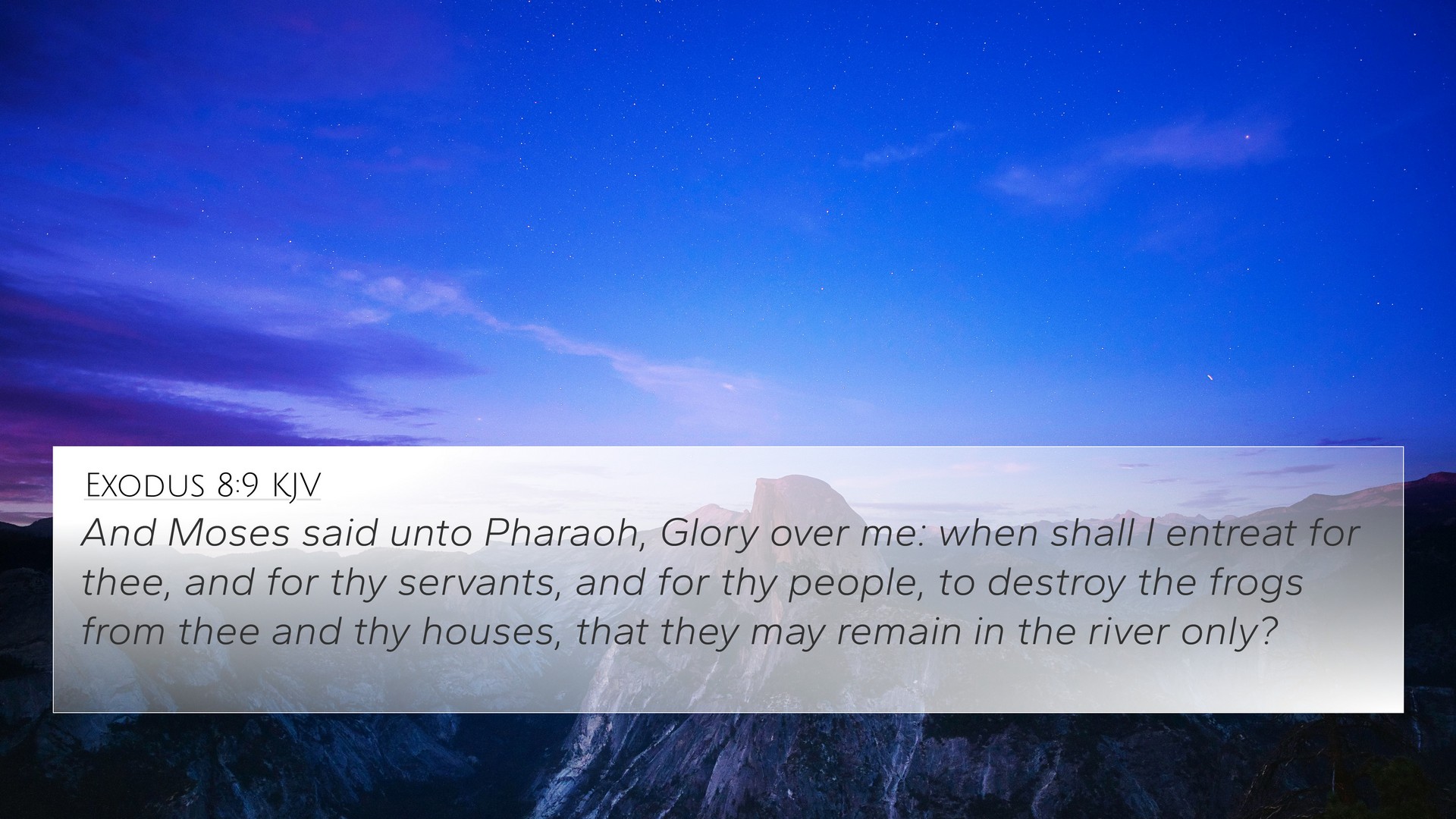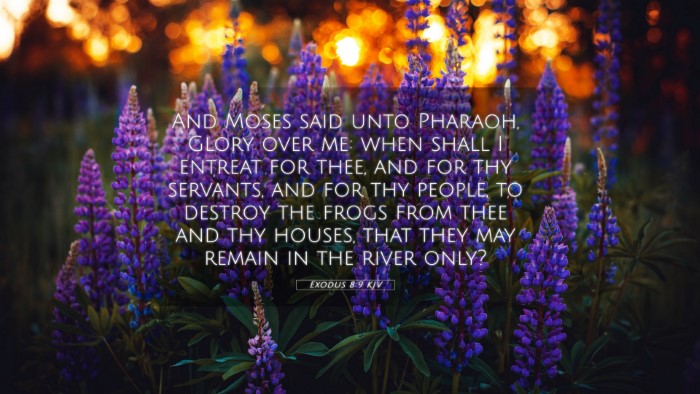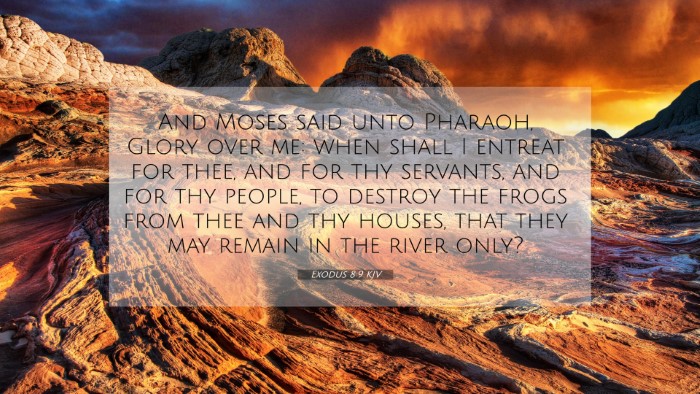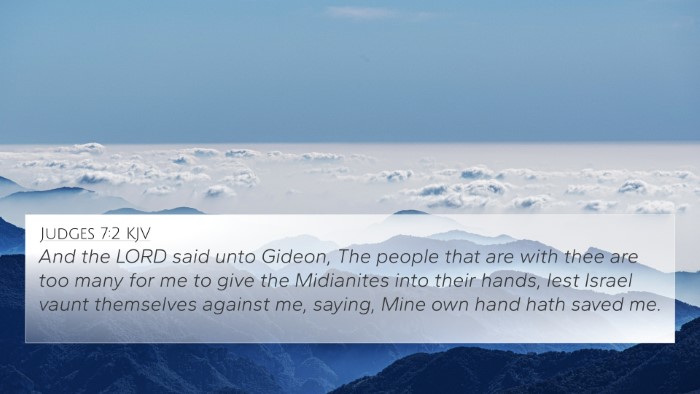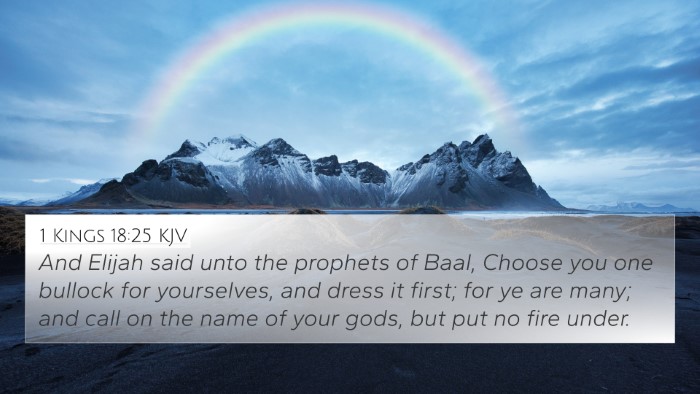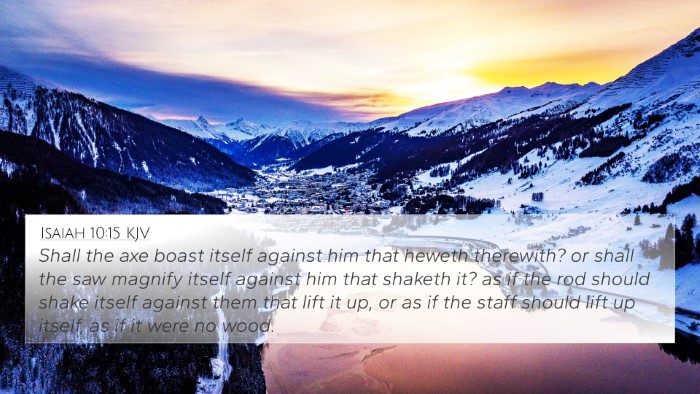Understanding Exodus 8:9
Exodus 8:9 presents a significant moment in the narrative of Moses and the plagues of Egypt. The verse reads, "And Moses said unto Pharaoh, Glory over me: when shall I entreat for thee, and for thy servants, and for thy people, to destroy the frogs from thee and thy houses, that they may remain in the river only?" This request reveals key themes of authority, intercession, and the power of God over creation and Pharaoh's stubbornness. Below, we explore a comprehensive understanding by utilizing insights from public domain commentaries, such as those by Matthew Henry, Albert Barnes, and Adam Clarke.
Exegesis of Exodus 8:9
The queries raised by Moses to Pharaoh emphasize two primary aspects: the desperate plea for relief from the plague of frogs and the opportunity for Pharaoh to show humility in response to God's power through Moses.
- Matthew Henry's Commentary: Henry notes that Moses here takes the lead in negotiating with Pharaoh, which showcases both the authority given to him by God and Pharaoh's increasing reluctance to yield. The phrase "Glory over me" points to the need for Pharaoh to acknowledge God’s supremacy, even in his pride.
- Albert Barnes' Notes: Barnes emphasizes the urgency in Moses' request. The continual presence of frogs was a plague both repulsive and disruptive, creating a clear reason for Pharaoh’s compliance. Barnes highlights the intercession aspect, revealing how Moses serves as a mediator not just for Pharaoh but for the entire nation of Egypt.
- Adam Clarke's Annotations: Clarke takes a linguistic approach, focusing on the term "entreat." He indicates that Moses is requesting Pharaoh to set a specific time for his appeal, suggesting not only trust in God’s power but also a structured approach to the situation. Clarke suggests that the outcome of this plague emphasizes God's control over even the most seemingly trivial aspects of nature.
Thematic Connections
Exodus 8:9 intertwines several themes central to the biblical narrative:
- God's Sovereignty: The plagues serve to illustrate God's power over Egypt's false gods and the natural order.
- Intercession: Moses acts as a mediator, an archetype for Christ's future role as intercessor for humanity.
- Stubbornness of Man: Pharaoh's response reflects the hardness of heart, a recurring theme in Exodus, symbolizing resistance to God’s will.
Cross-References for Deeper Study
Understanding Exodus 8:9 benefits significantly from exploring related Bible verse connections. Here are 10 options for cross-referencing:
- Exodus 7:26: Moses' signs reflect God's empowerment over water turning to blood.
- Exodus 8:1-2: The call for Pharaoh to let the people go aligns with the theme of deliverance and God’s demand for obedience.
- 1 Samuel 12:19: The Israelites request Samuel to pray for them, reflecting a similar plea for intercession.
- 2 Chronicles 7:14: The call to humility and prayer is a needed counterpoint to the pride demonstrated by Pharaoh.
- Psalm 78:43-51: A historical account of the plagues, evidencing God’s might and judgment.
- Isaiah 10:5: God using instruments of judgment reflects the same divine authority exhibited in Exodus.
- Romans 9:15-17: Discusses God's mercy and hardening of hearts in relation to purpose and testimony.
- Luke 11:14-20: Jesus confronts demonic authority, paralleling Moses’ confrontation with Pharaoh.
- Hebrews 3:15: Cautions against a hardened heart, referencing the rebellion in Egypt as a warning.
- Revelation 16:13-14: Connects plagues as a theme throughout scripture illustrating God's judgment over humanity.
How to Use Bible Cross-References
When digging deeper into the connections between Bible verses, the following steps can help:
- Utilize a Bible Concordance: This tool helps identify verses that share themes or phrases found in Exodus 8:9.
- Engage in Cross-Reference Bible Study: Create a list of related verses and read them in context.
- Explore Thematic Links: Search for broader themes such as redemption and intercession throughout the Bible.
- Study Comparative Analyses: Compare similar narratives across the Old and New Testament for a fuller understanding.
Conclusion
Exodus 8:9 stands as a pivotal verse in the narrative of Exodus, offering insights into God's desire for Pharaoh's acknowledgment and the broader themes of intercession and authority. This exploration encourages readers to use cross-referencing as a powerful tool for deeper biblical understanding, linking verses and themes that enrich one’s faith journey.
